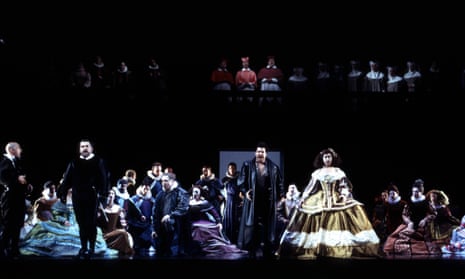First performed in 1844, Ernani, Verdi’s fifth opera, has something of the status of a cult thriller. Set in Renaissance Spain, it explores the consequences of a moral code that values honour above everything else – even life itself. The bandit Ernani, the implacable grandee De Silva, and Carlo, the Holy Roman emperor in waiting, are slugging it out for the love of De Silva’s ward, Elvira. But Ernani has also pledged his life to De Silva in exchange for his assistance in rescuing her from Carlo, who has taken her hostage, and the old grandee is soon demanding his oath be taken literally.
George Bernard Shaw admired “the fierce noonday sun” of the score, one of the young Verdi’s finest. The Chelsea Opera Group’s concert revival, conducted by Robin Newton, superbly captured the music’s fire and fury, and its sense of violent emotion held in check by social and political ritual. It was sung at thrilling full throttle – anything less won’t do – and dominated by the performance of Gwyn Hughes Jones in the title role. His voice is massive and a bit gritty, and he didn’t make his task any easier by opting to include a tricky extra aria that Verdi added – at Rossini’s request, for a performance in Parma shortly after the premiere – which is rather high for him. But the urgency and passion of his singing were gripping.
Helena Dix made a superlative Elvira, doing fine things with the big soprano showstopper Ernani! Ernani Involami. Jihoon Kim’s De Sliva was all the more creepy for being so admirably contained. Gerard Quinn’s Carlo was a fine portrait of a noble man very much in the grip of desire. The choral singing made up in energy and commitment for what it occasionally lacked in finesse. Rip-roaringly good.

Comments (…)
Sign in or create your Guardian account to join the discussion